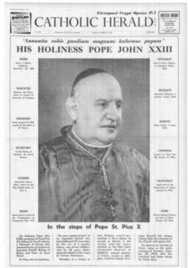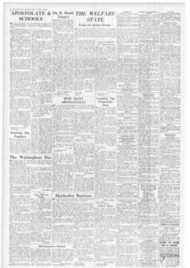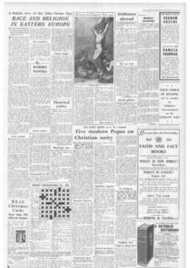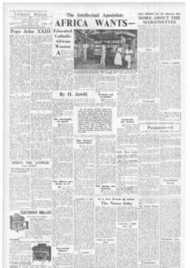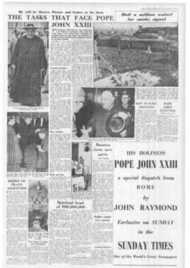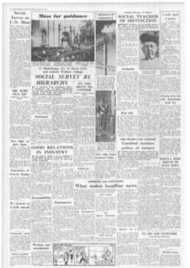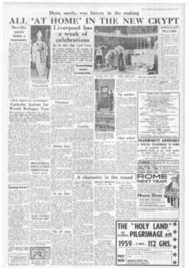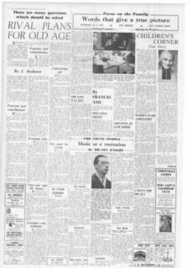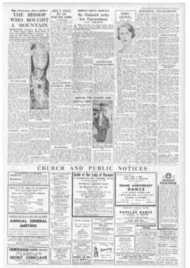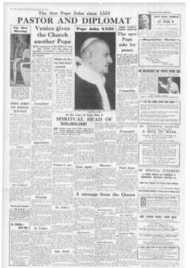Page 4, 31st October 1958
Page 4
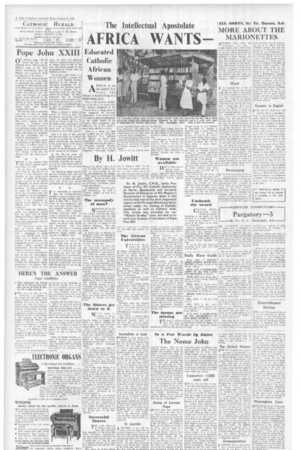
Report an error
Noticed an error on this page?If you've noticed an error in this article please click here to report it.
Tags
Share
Related articles
Vatican Sets Date To Open Archives
Pius Xii: The Verdict Of The Eyewitnesses
Charterhouse Chronicle
Secret Papers Vindicate Pope Pius Xii, Says Jewish Scholar
The Lessons Of The Cornwell Affair
In ts Few orris by Jolter
The Name John
Journalists in Luck
pROBAHLY many people were
hoping that the successor to Pius XII would not take the name Pius for the fourth time ill this century. Not, of course, because the name of such great Popes is not deeply venerated, hut simply because people like a change. Yet one wonders if anyone even thought of a Pope John XXIII. The last John as true Pope died in 1334 at the age of 84 -a good augury for our new Holy Father. He was a Frenchman and one of the Avignon Popes. Cardinal Baldassare Cossa was crowned pope with the name of John XXIII in 1410. But it was in the time of the Cireat Schism: in 1415 he was deposed by the Council of Constance and he is listed as an antipope. One has to go back to John I in the sixth century to find a papal saint of that name. After a short reign he was arrested and imprisoned by the Arian King Theodoric of the Ostrogoths. He died as a result of his imprisonment and is venerated as a martyr with his feast on May 27. As a journalist, one wonders whether the new Pope will often be referred to in the press as Pope John XXIII. We are so dependent on short names to make headlines that I imagine that "Pope John" or "John XXIII" -will he the commonest appellations, In either ease, the name for some time will surely sound very unfamiliar.
In Lourdes
A MEMBER of our staff was Cl close to the new Pope when. as Cardinal Patriarch of 'Venice and Pope Pius XII's special representative, he consecrated last March the underground basilica itt Lourdes in honour of his predecessor at Venice. The new Pope traced the huge crosses on the walls intoning at the same time with a remarkably firm voice the accompanying him else! phrases. Later, as our colleague stood near the altar, he watched the Cardina! correct the Master of C'erernonies when the latter invited him to proceed in a certain direction around the altar he was dedicating. hut the now Pope know better and beckoned the Master of Ceemontea to follow hint in the opposite direction. The Master of Ceremonies got his little revenge later on when at the Mass the Cardinal was about to turn to recite the Orate, jratres. The purple. robed priest beside hint waved his hand across the altar which, as visitors to Lourdes know, stands solitary and imposing in the centre of a vast building It Was an "instructionto the Cardinal not to turn around: people were all about hint, literally circumstantes. I wonder whether this was the first time His Holiness had celebrated Mass facing a congregation.
Status of Layman Pope
PEOPLE have been puzzled by our saying last week that a new 'Pope. even if a layman, " receives all his powers to gosern the Church, even before his ordination and consecration". The difficultly is that the Pope is the Bishop of Rome and the Bishop of Rome is the Pope. And he cannot be a bishop of anywhere until he is priest and bishop. Yet it is true that a religious non-priest or a layman would possess the full authority and jurisdiction of a Pope upon election, but, of course, he could not ordain or consecrate. The Pope, as a matter of fact, always has been Bishop of Rome. most theoloaians holdina that this connection exists by Divine Law. Some, however, think otherwise and hold that the Pope might choose another see or even have no see at all. An interesting point arises as to the ecclesiastical status, lay or clerical, of a layman elected Pope before ordination and consecration. The question should he of more than academic importance in the definition of the lay person's status within the Church.
Coronation —1,000 years old
THE fact that the Papal Corona' tion follows his election so quickly tends perhaps to detract from the greatness of the occasion; yet, according to the late Fr. Thurston, there are records of the ceremony going back 1,000 years when, then as now, it took place outside the Basilica of St. Peter's, though then the crowned Pope mounted his horse to ride home to the Lateran. The present ceremonies in their fulness go back to the 14th century. and nothing in them is more moving than the firing of the flax which dies out at once when the new Pontiff is reminded that " thus passeth away the world's glory ". Most Papal coronations, however, have taken place in the Pope's cathedral, Si. John Lateran, and Leo XIII was crowned in the Sistine Chapel. It is, of course, internationally, a great diplomatic function, and at the coronation of Pius XII the Duke of Norfolk was appointed the United Kingdom's Special Ambassador to the Holy See for the occasion. Who knows? perhaps the day will come when the Coronation will be nnetnnned
for some time. perhaps till the summer, when visitors from ail over the world could come to Rome to pay homage to the Pontiff,
The Oxford Manner .PEW TV occasions have excited • me more in anticipation than
the inclusion of Aldoils Huxley in the Sunday Brains trust. While, of course, in disaereentent with Aldous Huxley over most things,
have lung had the greatest admiration for his brilliant mind, the range of his interests and his way of writing. For me, he is by far the best contemporary novelist and essayist. Yet the first reaction to his TV appeararies:-1 do not mean his outstandingly handsome and, for his age, young looks—was disappointing. He seemed shy and unwilling to commit himself. I was strongly reminded of the rumour some years back that he was thinking Of becoming a Catholic via Fr Martin D'Arcy, S.J., a rumour which, 1 am told, was quite untrue. But between Aldous Huxley and Fr. DArcy there is a certain kinship. As with Aldous Huxley, Fr. D'Arcy in conversation and discussion is reluctant to commit himself, and he gives the impression that " this is not the occasion" to go deeply into a difficult subject and commit oneself to anything. Both manage to suggest. I am sure quitelinvoliiiitary, thoughts and knowledge too Odexefpordformawneorrdsu. suaTtlhye fdailffilsdetnot pieces in the H.B.C. Brains Trust, everyone being so eager to gel his say, but Aldous Huxley, Fr. D'Arcy, and, I may add. the Abbot of Downside retain it.
Overpopulation
T SUPPOSE that in this connection I should mention the unanimity a Ihm Hrains Trust on the need for universal contraception as the sole remedy for the rapidly increasing population of the world. I must confess that I myself have never collle across a really satisfactor) Catholic answer in scientific terms to the contention that only smaller families, especially in underdeveloped countries, can prevent a very awkward—to say the least—increase ill world population during the next 100 years. And in the nature of things it is hard to see bow smaller families will he general throughout the world save by the wider use of contraception. No doubt, the answer exists, and for my part I am content to accept the Church's teaching with the realisation that no one can foresee the future and how God will dispose it. It is certainly true that all through i my life and long before it an impossibly congested future populetion has been prophesied by the experts, but. despite this. standards of life have risen rather than fallen. How, then, can people be so dogmatic about the future?
Walsingham, Conn.
niSCUSSION on our letter page
about Walsingham and its original site has brought me a letter front the U.S.A. The writer is John William Trend, and the address is the very Christian one of Walsingham, s Bethlehem,aCconantheiclItii?ht.osreel has been dedicated to Our.Lady of Walsingham at this address, the hostel consisting of two houses, " Great Walsingham" and " Little Walsinsham." Apart from those, there are seven barite and a hermitage, all in time to be part of the hostel. He asks our readers to send him pamphlets. magazine articles, .medals or books on Our Lady of tWhealshi hostel g ufeosrtst haeninformationd to ul
meet growing interest in the devotion in
the nnifpri qIntpc
blog comments powered by Disqus


